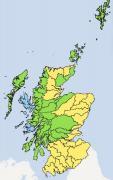SEPA - New Scheme For Assessing Licence Compliance
6th July 2008
Industries and public bodies in Scotland are being given the opportunity to comment on a new scheme to assess compliance with environmental licence conditions.
The Scottish Environment Protection Agency (SEPA) is looking to streamline its compliance assessment scheme across four regulatory regimes and is urging operators of power stations, landfills and water & sewerage supply, fish famers and chemical manufacturers to comment on its consultation, published today (7 July).
The watchdog has identified that improvements to its approach to assessing compliance with its licences, permits, authorisations and certain registrations will lead to more effective, transparent and efficient regulation. It is proposed to phase-in the new scheme from 1 January 2009. Colin Bayes, Director of Environmental Protection and Improvement said, "SEPA aims to be an excellent environmental regulator, enabling business to understand their environmental responsibilities, to comply with the regulations and to
realise the many economic benefits of good environmental practice and performance.
"The new scheme is about SEPA streamlining compliance with licence conditions; it's not about asking industry and other waters users to provide additional data or increase reporting effort. The new scheme will be targeted, efficient and effective. It will help us to deliver the desired environmental outcomes by working directly with licence holders. Public scrutiny of the published compliance results, along with potential financial incentives, is intended to encourage better environmental performance."
The consultation was largely shaped by industry representatives at a workshop hosted by SEPA in May this year. Additionally, licence holders have volunteered to work alongside SEPA by participating in joint trials of the scheme during summer 2008.
Details are available from www.sepa.org.uk/consultation, and responses are invited before 3 October 2008. These can be sent by writing to Compliance Assessment Scheme Consultation, Scottish Environment Protection Agency, Erskine Court, Castle Business Park, Stirling FK9 4TR; or by emailing sepacomplianceproject[AT]sepa.org.uk
Related Businesses
Related Articles
Water scarcity report from SEPA
The river catchments of the Nith, Dee (Galloway), Cree, Doon, Irvine and Ayr and the Clyde have been raised to Alert. The river catchments of the Shin, Naver, Conon, Spey, Deveron, Ythan, Don (Aberdeenshire), Dee (Aberdeenshire), Esk, Firth of Tay, Firth of Forth, Almond, Tyne (Lothian), Tweed, Esk (Dumfriesshire), Annan and Thurso remain at Alert.
Working together for the North Highland water environment
Protecting and enhancing the natural waters of the North Highland area is a huge task involving many organisations and communities, and Scotland's environment watchdog is urging all those with an interest to get involved. The Scottish Environment Protection Agency (SEPA) is asking interested local communities and businesses to read the draft River basin management plans (RBMP) and Local area management plans (AMP) and feed back whether they think the plans are comprehensive enough, how they can help to achieve the aims of the plans, and how we can all work together to achieve them.New environmental regulations needn't be costly
In the current economic climate it is essential businesses are prepared for new regulations, as failure to comply could lead to increased costs. NetRegs (www.netregs.gov.uk) is a free UK website offering environmental guidance for businesses and is delivered in partnership with the Scottish Environment Protection Agency (SEPA).Scotland's recycling rate continues to rise
Scotland's recycling and composting rate continues to make steady progress. Figures released today (Friday 13 February), by the Scottish Environment Protection Agency (SEPA), show that Scotland's annual recycling and composting rate rose to 32.9% for the year October 2007 to September 2008.New approach to improving the future health of Scotland's water
Scotland's environment watchdog has found that 57% of Scotland's water is in good condition, or better. This provides an excellent basis for our future livelihoods, economy and recreation.NORTH-EAST FARMER FINED FOR RIVER POLLUTION
A north-east farmer was fined �2000 for allowing diesel to enter surface water drains and into a tributary of the River Ythan causing pollution of the river. Mr Roger Glennie from the Hillhead of Ardo Farm, Methlick, Ellon pled guilty today (21 January 2009) to a contravention of legislation designed to protect the water environment.SEPA cuts red tape in waste regulations
The Scottish Environment Protection Agency (SEPA) has announced further steps to reduce bureaucracy, while still ensuring high levels of environmental protection. Changes have been put in place to how SEPA enforces three sets of regulations; the Producer Responsibility (Packaging Waste) Regulations, the Waste Electrical and Electronic Equipment Regulations (WEEE) and the Trans Frontier Shipment Regulations (TFS).Climate Change Plan for SEPA published
With the Climate Change Scotland Bill now in parliament, it is important that everyone starts thinking how they will contribute to the ambitious world leading targets set out in the Bill. As Scotland's environment watchdog, the Scottish Environment Protection Agency (SEPA) has a key role in addressing climate change and has today (19 December) published its climate change plan for SEPA.SEPA reveals 10-point plan to support economic activity
The Scottish Environment Protection Agency (SEPA) has developed, with Government, a 10-point Plan to support economic activity during the current difficulties. The aim is to help the economy whilst also protecting the environment and the health and well being of communities across Scotland.SEPA urges everyone to have a safe and happy Bonfire Night
Now that the evenings are getting darker, and colder, many people are starting to think about Autumnal celebrations like Hallowe'en and Bonfire Night. While huddling round a blazing bonfire is an important part of the celebrations, and a good way to keep warm, the Scottish Environment Protection Agency (SEPA) is reminding everyone that careful consideration needs to be given to what goes on any pyres.
